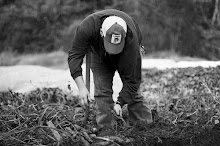Simple strategies to control pests in a sustainable farming system:
"Controlling pests and disease organically means much more than simply changing the types of sprays and dusts you use. Organic gardeners strive to develop a balanced system where problems are regulated naturally and where there is little or no need to use even the safest organic sprays to control pest problems."
The majority of plant life will be strong and healthy by simply growing them in healthy soil and a suitable location. By growing plants within their natural conditions they will magically thrive. There are usually greater problems with pests in monocropping situations, where only one type of tree or plant is grown in a concentrated area, than there are in a diverse cropping scheme. Many pests and diseases can be prevented by site selection alone.
Healthy soil is a must. It should have a good tilth for the roots to flourish by finding and accessing the nutrients the plant needs. And of course a healthy pH is key. This affects the availability of certain nutrients to the plant affecting it's overall vigor and pest resistance. What is the natural soil pH, and what are the plants' needs? You can have your soil tested by your local Cooperative Extension Service. Use the results as a guideline. Soil pH can easily be improved by incorporating compost, mineral fertilizers, mulch, lime, and soil amendments as needed. Help the soil balance by growing green manure crops, adding organic matter each season.
Opt for transplanting over direct seeding whenever possible. Choose the healthiest transplant when selecting for your garden. This will make all the difference. You can usually tell a strong transplant by a few details: Choose straight, strong looking plants with bushy, compact growth, and green healthy leaves, making sure the plant is not too big for it's pot and that root formation is not too compacted or tightly spiraled.
Companion plant and have as diverse a garden as possible, avoiding monocultures. Mix strong smelling herbs like rosemary and basil in with your crops, and flowers like merigolds. These will confuse and deter many pests...and disease. This is one reason tomatoes do so well with basil. Basil repels pests like tomato hornworms.
Providing an environment for beneficial insects will be immeasurably helpful! This includes birds too. Help create a enjoyable habitat for them; birdhouses etc. Letting a small percentage of your crops flower helps this process greatly, plants like arugula and radish.
Rotating crops takes away pests' previous home and you get a fresh start with that plot each season. Knowing plant families and their relatives is very helpful. For example, you want to keep Solinaceous crops moving. Don't plant tomatoes where you had the peppers the season before because they are in the same family and will attract the same pests. Another example is the mustards and cabbage family, Brassicaceae or Cruciferae. This includes broccoli, cauliflower, turnip, mustard, radish, horseradish, rapeseed, cress, and watercress. A three year rotation is a good rule of thumb.
Develop a keen eye for scouting. Keeping an eye on plants when they are very young puts you ahead of the game when it comes to weed control. And, excellent record keeping helps you to know what pests to expect and when to expect them. You'll know exactly what to do next time, and will have a good jump on any problems.
Avoid handling plants when they are wet. Moisture provides the perfect magnet for mold, disease, etc...
(Right now I sound like the plant guy on HGTV reading this back to myself...)
A few more helpful facts and a brief review:
Lady bugs control aphids in your organic garden.
Inspect plants for weeds and pests.
Mold on plants can be defeated by a particular companion fungus.
Scouting - Being on the ground and looking, check under leaves and row covers.
Biological sprays like BT are an absolute last resort.
Crop rotation - each growin season alternate plant families in each plot.
Allow a small percentage of crops to flower, in order to create habitat for beneficial insects.
Create diversity - varietal differences, crop rotation.
Promote earthworm populaton in soil.
Promote healthy soil microbial activity, and PH levels, by introducing plenty of organic matter
Use organic mulch - incorporating 2-3 weeks after maturity, depending on crop and weather.
Using drip irrigation targets water flow beneath plants, wet plants are more subject to mold/desease
In a dry year we have less disease and lower weed pressure
Wet seasons may cause just the opposite.
Opt for transplanting instead of direct seeding when possible.
a) Much more mature and durable plants will be stronger to protect themselves against pests, weeds, and weather conditions.
Text studied, 'The Organic Gardener's Handbook of Natural Insect and Disease Control'
Sustainable Farming Methods and Practices
4 years ago




No comments:
Post a Comment